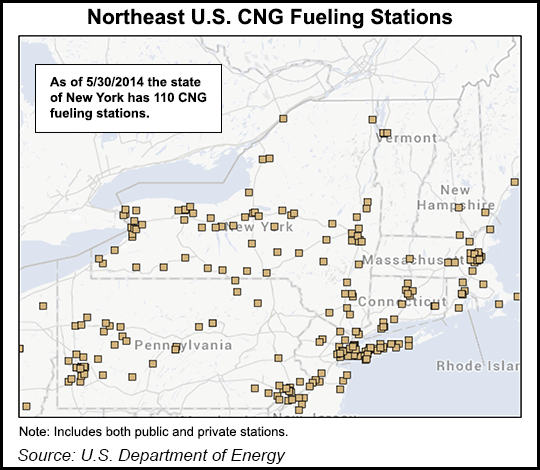Infrastructure | NGI All News Access
New York Grants Spur 12 New CNG Fueling Stations
The New York State Energy Research and Development Authority (NYSERDA) said on Tuesday it is making $3.6 million in grants available to help nurture 12 additional fueling stations for compressed natural gas (CNG). Grant proposals are due by July 9.

NYSERDA said it will provide up to $300,000 for each site to help cover eligible capital costs, including installation labor for backers that are prepared to pay for half of the station costs. The state agency said it also could provide up to $500,000/site for developers willing to cover up to 75% of a station’s cost. Engineering and permitting costs will not be covered by the grants.
The agency anticipates multiple awards resulting in approximately 12 new CNG fueling facilities, a NYSERDA spokesperson said.
The Albany, NY-based state entity said it sees the boost for natural gas fueling stations as a means of backing out imported oil by using what has become a totally domestically produced U.S. energy source: natural gas.
“Every gallon equivalent of natural gas used in vehicles is one less gallon of petroleum that has to be imported,” said NYSERDA.
As introduced at the recent ACT (Alternative Clean Transportation) Expo in Long Beach, CA, a unit of Parker Hannifin (PH) is marketing a new gas regulator for medium- and heavy-duty vehicles and a new high-flow CNG dispenser for fleet and industrial applications.
The new gas regulator is touted as adding 10-15% more usable range to CNG-powered vehicles through what the PH Veriflo Division claims is the highest flow rates in the industry with the lowest low-pressure operating parameters. “The regulator system offers stable, reduced pressure delivery and control of natural gas throughout the full range of extreme engine and environmental operating conditions,” according to Parker’s product information.
PH Veriflo also now has an industrial bulk CNG dispenser it claims is the only entirely integrated fuel dispenser currently being marketed. Parker cites several “breakthrough” features in the new dispenser.
In Canada, the South Coast British Columbia Transportation Authority based in Vancouver has ordered 45 new CNG Xcelsior brand transit buses from New Flyer Industries, and the deal includes options to purchase 135 more buses in two single-year renewable option periods, according to New Flyer.
The transit authority, Translink, over the past 23 years has purchased more than 1,100 natural gas-powered buses from New Flyer, a leading U.S. and Canadian bus manufacturer based in Winnipeg, Manitoba.
Committed to clean fuel vehicles, Translink operates 40- to 60-foot buses using clean diesel, diesel-electric hybrids and electric trolleys, in addition to various natural gas vehicles (NGV).
“The technology associated with CNG buses has proven to be cost effective to operate and on par to maintain and drive when compared to traditional diesel buses,” said Translink COO Doug Kelsey in a New Flyer announcement on the sale.
In the broader liquefied natural gas (LNG) transportation sector for everything from buses to marine transport to railroad locomotives, an advanced LNG onboard tank has been introduced by Chart Industries. It was demonstrated at two recent clean transportation meetings, providing the same basic technology but increasing the fuel capacity by 6% using the same size vessel as older models, according to Chart’s Peter Murray, LNG fueling products general manager.
© 2024 Natural Gas Intelligence. All rights reserved.
ISSN © 1532-1231 | ISSN © 2577-9877 |
